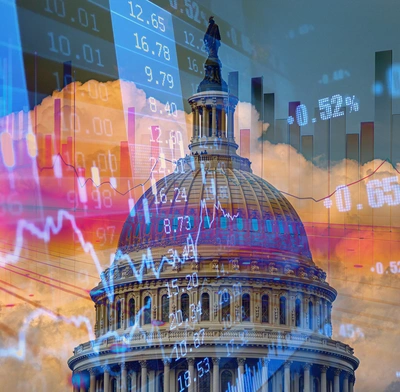Lawmakers in Washington have burned through long nights in recent weeks to decipher the ramifications of President Trump’s proposed GENIUS Act, a bill that could boost crypto valuations while providing clear regulatory framework to guide the industry.

The draft legislation initially enjoyed bipartisan support and was largely seen as a step in the right direction in a country where the establishment has struggled to keep pace with the development of digital assets in business and everyday lives. Crypto investors and enthusiasts are glued to the process to see whether a consensus can be reached, or the political spat will drag on.
Integrate stablecoins
The bill would integrate stablecoins more closely into the financial system, allowing for greater investment opportunities and transactional capabilities. Named after a self-promotional social media post by the President, the GENIUS Act follows a renewed drive under the Trump administration to boost the US’s domestic crypto industry”.
However, the bill’s feasibility and odds of being passed have been stymied as the legislation has come under intense scrutiny by Senate Democrats. They have raised concerns that the bill in its current form lacks sufficient safeguards to prevent corrupt-dealmaking and bribery. Specifically, Democrats cited a recent deal in which an Abu Dhabi based investment firm used the Trump-backed stablecoin (USD1) to finance a $2 billion investment in the exchange Binance.
They also note a private dinner hosted by President Trump for the top 220 investors in the memecoin $TRUMP, an announcement which saw the token’s value skyrocket almost instantly.
Corruption allegations
According to Senator Elizabeth Warren, Ranking Member of the Senate Banking, Housing and Urban Affairs Committee, “The biggest corruption scandal in modern history is unfolding right now … Trump has created the opportunity to trade presidential favors like tariff exemptions, pardons, and government appointments for crypto purchases that will directly benefit himself and his family.”
The proposed legislation also, as she claims, opens the door for financial malfeasance due to what Senate Democrats perceive to be limited guardrails and oversight into the use of stablecoins as a financial instrument.
On the other hand, the White House argues that the U.S. urgently needs a clear and consistent national framework for stablecoins to remain competitive in the evolving global financial landscape—an argument echoed by some policymakers, business leaders and investors.
Remain optimistic
By standardizing how stable coins are issued and backed, the GENIUS Act could reduce systemic risks and curb the kind of speculation and volatility that has marred the crypto sector, proponents of the legislation have argued.
Lawmakers are continuing to deliberate and remain optimistic that they can pass a revised version of the bill before members of Congress return to their constituencies in August. A consensus could have wide-reaching implications for the entire crypto space with other governments incentivized to pass their own rules, or face exclusion from the regulated marketplace.







